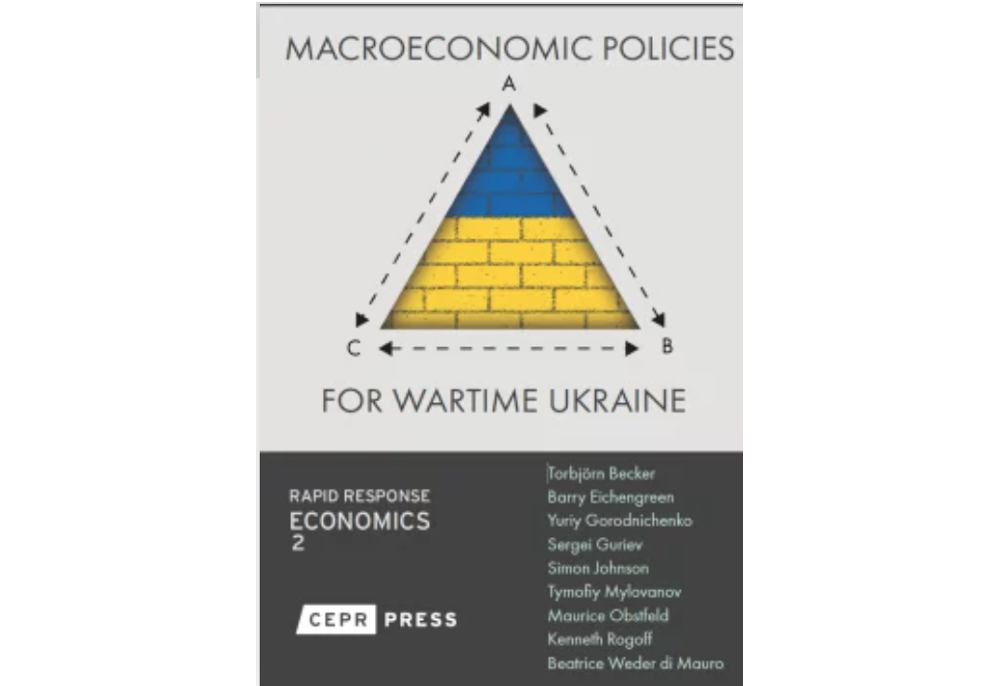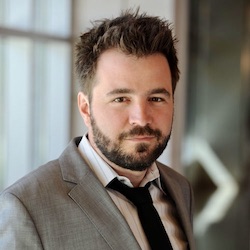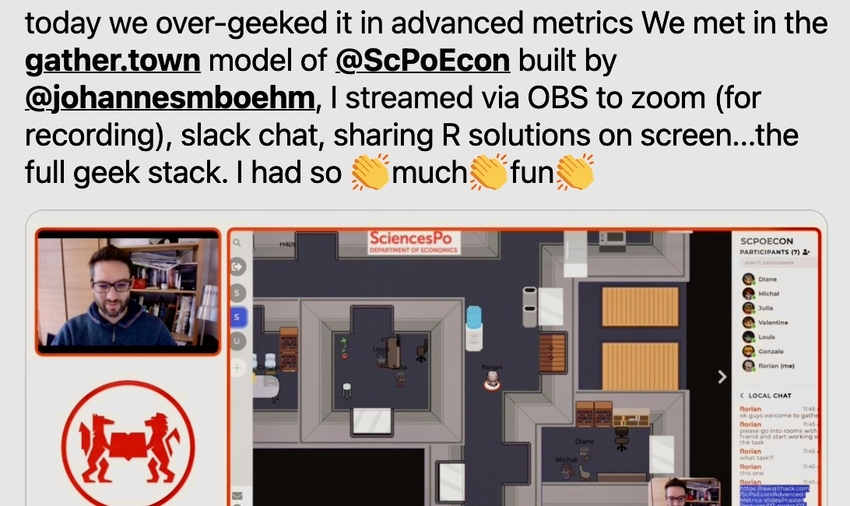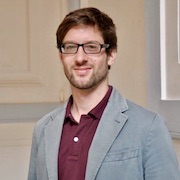Empirical IO Seminar *online* - Sept 13th

 Vector gear infographic elements
Vector gear infographic elements

Fabiano SCHIVARDI is Full Professor of Economics and and Vice-Rector for Research at LUISS University. He is also a Research Fellow at the Einaudi Institute for Economics and Finance (EIEF), and at the Centre for Economic Policy Research (CEPR), and an IGIER Fellow. Among his editorial duties, he is Member of the editorial board of the online economics blog, www.lavoce.info.
His research interests are in Applied Micro, Corporate Finance, and Entrepreneurship. Internationally recognised for his research, he was recently awarded an ERC Advanced Grant for his project Industrial Structure and the European Productivity Growth Divergence.
Fabiano SCHIVARDI will present a paper, joint with Julien Sauvagnat, at the next Empirical IO Seminar on the theme:
Are Executives in Short Supply? Evidence from Death Events (read paper, PDF 1.28 MB)
More about Fabiano SCHIVARDI and his research
Date: Tuesday, September 13th - 3:15 PM
Location: via Zoom (link to follow via email)
Our next Empirical IO Seminar will host Giacomo CALZOLARI (European University Institute) on September 27th.
Launch: the Macroeconomic Policies for Wartime Ukraine Report

 Cover of Macroeconomic Policies for Wartime Ukraine Report
Cover of Macroeconomic Policies for Wartime Ukraine Report
The Centre for Economic Policy Research (CEPR) is hosting an in-person and online event this week to launch the Macroeconomic Policies for Wartime Ukraine Report and would like you to attend.
When? WEDNESDAY, September 14th - 5 PM CEST
Where? Maison de La Chimie, Salle 201 and online
In order to attend, you must register online
As Ukraine faces the prospect of a prolonged war, there is a growing need to reassess the country’s macroeconomic strategy to ensure its long-term economic stability and survival. The current policy mix, which relies heavily on running down foreign reserves, tax suspension, and other temporary measures, is increasingly untenable. It could result in a major economic crisis that would cripple Ukraine’s ability to sustain its war effort over an extended period.
A new CEPR Rapid Response Economics report (download the report) outlines key macroeconomic policies to realign the economy towards a more sustainable trajectory, capable of withstanding the pressures of a drawn-out conflict. This requires prudence and caution in public finances, a durable nominal anchor, a resilient financial system, careful management of external balances, and flexibility and efficiency in the allocation of scarce resources. Sergei GURIEV is one of the authors of the report.
Read more about the programme on CEPR's event page

Recently appointed Provost at Sciences Po, Sergei GURIEV is a permanent faculty member at the Department since 2013 and a Senior Fellow to the Chair of Fundamental Research of the Institut Universitaire français (IUF). In 2016-19 he served as the Chief Economist of the European Bank for Reconstruction and Development.
He teaches and does research in political economics, labour mobility, development and transition economics.
Prior to joining Sciences Po, he was the Rector of the New Economic School in Moscow.
Roy-ADRES Seminar - Sept 12th

 Portrait of René Roy and stylised equations
Portrait of René Roy and stylised equations

Emir KAMENICA is the Richard O. Ryan Professor of Economics and Neubauer Family Faculty Fellow at the University of Chicago Booth School of Business. Among his editorial duties, he is notably the Editor of the Journal of Political Economy.
He studies an eclectic set of topics in microeconomics with a focus on theoretical work in information design. His work has garnered him a number of honours and fellowhips including the 2013 Alfred P. Sloan Research Fellowship. He also holds an honorary doctorate from Shepherd University.
Emir KAMENICA will present a paper, joint with Ben Brooks and Alex Frankel, at the next Roy-ADRES Seminar on the theme:
Comparisons of Signals (read abstract, PDF 57.42 KB)
More about Emir KAMENICA and his research
Date: Monday, September 12th - 5 PM
Location: PSE - Jourdan Campus - R1-09
Our next Roy-ADRES will host Rani SPIEGLER (Berglas School of Economics, Tel Aviv University) on September 19th.
Honorary Mention for F. Oswald

 Tweet from Florian Oswald about online econometrics course
Tweet from Florian Oswald about online econometrics course
The European Economic Association (EEA) announced the recipients of its 2022 Award for Innovation in Teaching this past week. The 2000€ prize is awarded to an individual or group, who has demonstrated innovation in their teaching. The Award Committee received very strong applications from more than 15 institutions including UCL, University of St.Gallen, KU Leuven, and… Sciences Po!
The Department’s permanent faculty member Florian OSWALD received an honorary mention, alongside UCL’s Centre for Teaching and Learning Economics. The laureate - the Graduate Applications International Network (GAIN) - was commended for its work in supporting prospective graduate students from across all countries in Africa, in applying for postgraduate and PhD programmes in Economics and other related subject such as political science.
Florian teaches three courses (undergrad Introduction & Advanced Econometrics, and PhD-level Computational Economics) whose “unifying feature is that they all use a fair amount of computer code to either help illustrate core concepts…, or indeed because code is the main content to talk about.” In his own words, these are “data science courses for economists”.
For Florian, such courses must be “hands on” – “working with computers and software to solve problems needs to be practiced first hand, i.e. by the students themselves” – and is a strong believer in the virtues of team work – not only do less experienced students stand to gain from more experienced ones, but the advanced students also benefit from having to teach concepts and to view problems from a different angle at times in order to better explain them to their peers. And all students stand to benefit from overcoming “a certain form of stigma which deters them from asking questions”.
This teaching philosophy undoubtedly warranted the EEA’s honorary mention for innovation in teaching. It also helped Florian, as well as Jean-Marc ROBIN, address a critical issue for undergraduate econometrics courses: students were complaining that the ‘traditional’ econometrics course was either too hard, too mathematical, or too easy and not challenging enough.
Florian and Jean-Marc “took the dramatic step to completely eliminate all linear algebra and proofs” preferring “interactive simulation exercises” and “(investing) heavily in producing R interactive apps and online quizzes for moodle”.
They also chose tools that would foster simple and clear communication as well as team work. According to Florian “these are exciting times to try out new environments for teaching, and everything that makes teaching (and learning) more fun and enjoyable should be an option. In November 2020 for example, we used the custom-built gather.town model of the department of economics at Sciences Po in order to do group work in the econometrics course. Students choose different virtual “rooms” to sit in (they have to walk around on screen in a very simple 2D setting), and then talk to each other in a video-conference.”
The student feedback has been overwhelmingly positive. Congratulations to Florian Oswald !
Read the EEA announcement
To learn more about Florian’s innovative teaching methods and student feedback, check out his blog on his website

Florian OSWALD joined the Department in 2015. Specialised in housing, urban, macro and labour economics, he is also interested in the computational techniques required for structural estimation of microeconometric models.
Departmental Seminar - Sept 12th

 Stylised calendar data
Stylised calendar data

Fedor ISKHAKOV is Professor of Economics and Australian Research Council (ARC) Future Fellow at the Research School of Economics of the Australian National University. He was a Senior Research Fellow at the ARC Centre of Excellence in Population Ageing Research (CEPAR) for three years before joining the faculty at the Australian National University. Among his editorial duties, he is the co-founder and Editor-in-Chief of the Journal of Open Source Economics (JOSEcon) since 2019, and was a guest co-editor for special issues of the Econometrics Journal University of New South Wales and the Journal of Econometrics (Annals of Econometrics).
He is an applied microeconometrician and a computational economist working in the field of structural estimation of dynamic models of individual and strategic choice, with applications to labour economics, public economics, durable goods markets, household finance, applied industrial organization and dynamic games. His work is internationally recognised and has been awarded a number of important research grants, the latest of which is an ARC Future Fellowship for his project Solving and estimating dynamic models of strategic interaction.
Fedor ISKHAKOV will present a paper, joint with Kenneth Gillingham, Anders Munk-Nielsen, John Rust, and Bertel Schjerning, at our next Departmental Seminar on the theme:
Equilibrium Trade in Automobiles (read paper)
More about Fedor ISKHAKOV and his research
Date: Monday, September 12th - 2:45 PM
Location: Department of Economics - 4th floor - Room H 405
Our next Departmental Seminar will host Christine L. EXLEY(Harvard Business School) on September 19th.










